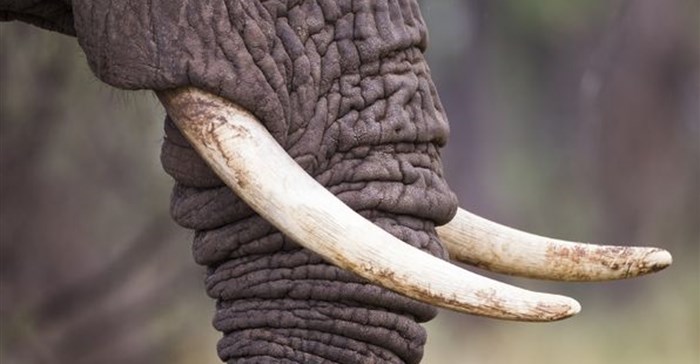
Subscribe & Follow
Law enforcers seize 32 tons of illegal ivory in 2015

This is according to Kelvin Alie, director of the International Fund for Animal Welfare's (IFAW's) Wildlife Trade Programme.
"Over and above the large-scale seizures, one cannot ignore the innumerable smaller quantities of ivory seized. In total, IFAW's records show that 143 seizures of ivory were reported in the media during the course of 2015, with the majority of those taking place in South East Asia and Asia - in particular, Thailand, Vietnam and China and in countries across Africa," Alie said.
Large seizures
More than 32 tons of poached ivory has been reported seized during 2015, with at least 18 seizures of amounts classified as large, i.e. in excess of 500kg.
In Thailand in April two seizures alone added up to seven tons, while one seizure in Singapore in May weighed 3,7 tons; in August in Da Nang, Vietnam law enforcers grabbed 3,903 tons of illegal ivory in three separate confiscations. In November Vietnam seized a further 860kg of ivory and most recently - on 17 December - Vietnam seized a further 2,2 tons of ivory from Mozambique.
The global security agency Interpol recognises large scale seizures as an indicator of organised crime behind illicit ivory trade.
In 2013, a total of 41,5 tons of illegal ivory was reported seized, and last year the iWorry campaign said 17,8 tons of ivory had been reported seized between January and August 2014. Alie said that between 25,000 and 50,000 elephants were dying each year for their ivory.
Rhino poaching
More cause for concern is rhino poaching. In South Africa in 2014, 1,215 rhinoceros were killed for their horns. Figures for 2015 have been kept under wraps by the SA government, with their most recent statement on current rhino poaching statistics being 27 August, when it was announced that 749 had so far lost their lives to poachers during 2015.
"However, we know from media reports and anecdotal information that rhinos have continued to be poached regularly since the government's August announcement," said Alie.
Three weeks ago the South Africa High Court ruled to allow domestic trade in rhino horn to resume with immediate effect. The Minister for Environmental Affairs has since tabled papers to appeal this decision.
IFAW said that while it applauded any confiscation of illegal ivory, it was crucial that governments looked beyond seizures and employ the necessary tools and expertise required to disrupt and dismantle trafficking.
How to stop poaching
"The only way countries are going to stop poaching of elephants and illegal trade is by cooperating with bodies such as the International Consortium for Combating Wildlife Crime and partner institutions such as Interpol and the law enforcement bodies of other governments to map and profile those behind this transnational criminal activity and dedicate the resources needed to stop those who seek profit from ivory trafficking.
"There is a great need to focus on strategies that will halt the killing of these magnificent creatures," said Alie.
IFAW and Interpol recently signed an agreement that extends their worldwide cooperation to combat wildlife and environmental crime. "In 2013 IFAW became the first-ever conservation NGO to sign an agreement with Interpol's Environmental Security sub-directorate to support law enforcement efforts to combat transnational organised wildlife crime."
To date, more than 2,800 participants have attended IFAW's Prevention of Wildlife Trafficking trainings across 81 training workshops in approximately 38 countries. Many of these have been conducted in partnership with Interpol.
Contact: Christina Pretorius
tel. +27 21 701 8642
Mobile: +27 82 330 2558
email. cpretorius@ifaw.org






